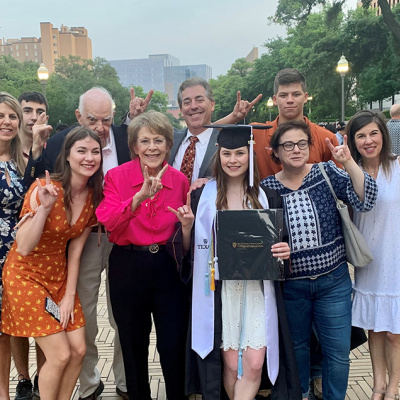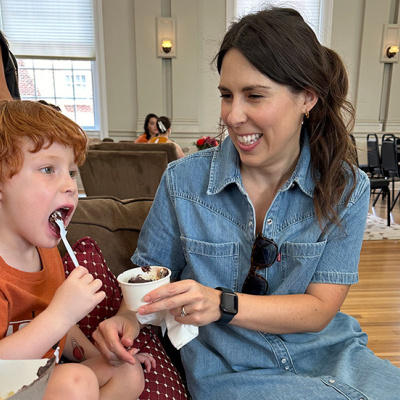A Longhorn Looks Back on Four Years That Changed the World—and Her Life—Forever
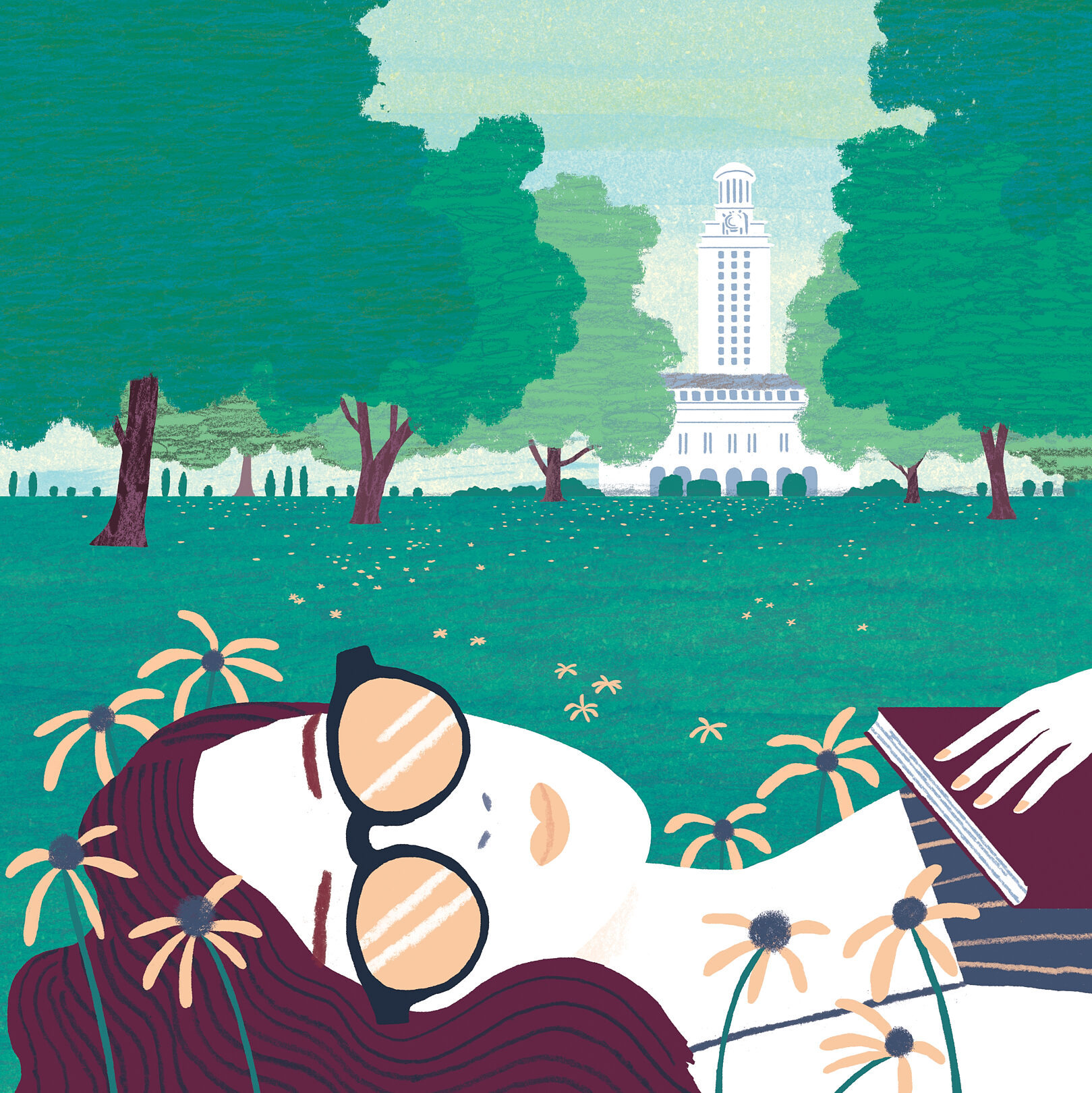
One of the few Halloweens I remember from my childhood in Houston is tinged in orange and white—not from candy corn, but from our UT-themed family costume. My dad graduated from UT with a degree in American Studies in 1987, and he’d raised us on stories of his beloved time at the university. My brother dressed as Colt McCoy, my dad as Mack Brown, and me? An unidentified Longhorn cheerleader.
A few years later, my dad, my mom, my brother, and I visited Austin for a football game during the hottest days of August. We could only afford tickets that were right next to Smokey the Cannon. I kept forgetting to press my hands over my ears every time we scored. I was disenchanted and overheated, but my Longhorn pride survived the weekend.
When it came time to consider where I would attend college, though, UT was last on the list of 17 universities to which I considered applying. Because I was within the top 6 percent of my high school class, I was automatically admitted to the university, and I found out before my second semester of senior year that I had also gotten into the Plan II Honors program.
I knew I was ridiculously lucky to consider this a “safety” option, but I was worried about getting lost among a student population of 50,000 after going to a performing arts magnet high school where I knew almost everyone. I assumed that there wouldn’t be a place for me at UT, based almost exclusively on stories of my dad’s views of the Drag from his balcony at the Goodall Wooten or standing up the dining hall of his frat house to recite the Greek alphabet.
Still, I applied to the Forty Acres Scholars Program on a whim and because my high school librarian insisted. Her daughter was a sophomore in the program, but no one from our school had made it past the semifinalist round since then. Forty Acres is the only full-ride merit scholarship offered by the Texas Exes, so the application process is grueling for good reason. In my year, more than 4,000 people applied, which got whittled down to about 120 semifinalists.
Marilyn White, BA ’59, Life Member, a universally beloved Texas Exes volunteer and donor, conducted my phone interview to make it to the finalist round, and I fell in love with her. I started to see UT through her eyes, and if you know Marilyn, you know her enthusiasm is inescapably infectious.
I’d always imagined myself at a rarefied, ivy-walled liberal arts college in the Northeast, as far away from Texas as I could get—but financial aid counselors explained to my mom and me that our FAFSA-determined “expected family contribution” automatically considered both parents’ salaries, even if only my mom intended to contribute. I was stubborn and reluctant to let go of my dream, and I didn’t think I’d end up with the scholarship. Surely there were finalists who actually wanted to go to UT who would get it over me.
I explained this to three current Scholars the night before finalist weekend began, when the program pulls out all the stops to show the 60-70 finalists how amazing the school is and conducts the final round of interviews via in-person committees. Emma Rappold, BS ’20, Life Member; Jill Young, BFA ’20; and Yessmeen Moharram, BS, BA ’21, were living in the same apartment complex, and we all crowded into Emma and Jill’s living room, with me sitting in the middle of everyone on my air mattress. Jill introduced me to their gecko, named The Mayor, of all things.
I heard about how Emma and Jill found quick friends in each other during their own finalist weekends. Yessmeen was only one year below them, and all three had a shared interest in the entertainment business. Many Forty Acres Scholars are Plan II and/or Canfield Business Honors students, so they were excited that I could potentially add another Scholar in the Moody College of Communication, though I would be double-majoring in journalism and Plan II.
Emma and I really hit it off. She shared her dream of attending university in California, where she wanted to break into the film industry. But pursuing a career in the arts almost always entails years of financial instability—literally paying one’s dues as one ascends within a rigid hierarchy. She’d realized that the best way she could set herself up for success and creative freedom in her future career would be to graduate without hundreds of thousands of dollars in student debt.
At the time, I knew I wanted to be a writer, and though I didn’t exactly know in what capacity yet, I knew the creative fields were analogous in many ways. And I knew Emma had a powerful combination of wisdom, gratitude, generosity of spirit, and self-possession that I would come to recognize in so many people associated with the Forty Acres Scholars Program.
I went on to meet more current Scholars, deans of the colleges of Liberal Arts and Communication, and many other friends of the program who represented the height of success in their respective professions. After many formative conversations that weekend, I remember thinking to myself in passing, Maybe I should go to UT even if I don’t get the scholarship. When I registered this thought, my hand froze above the page where I was taking notes in one of the mock lectures for finalists, taught by Professor Erik Dempsey, who would go on to be one of my most valuable mentors in college.
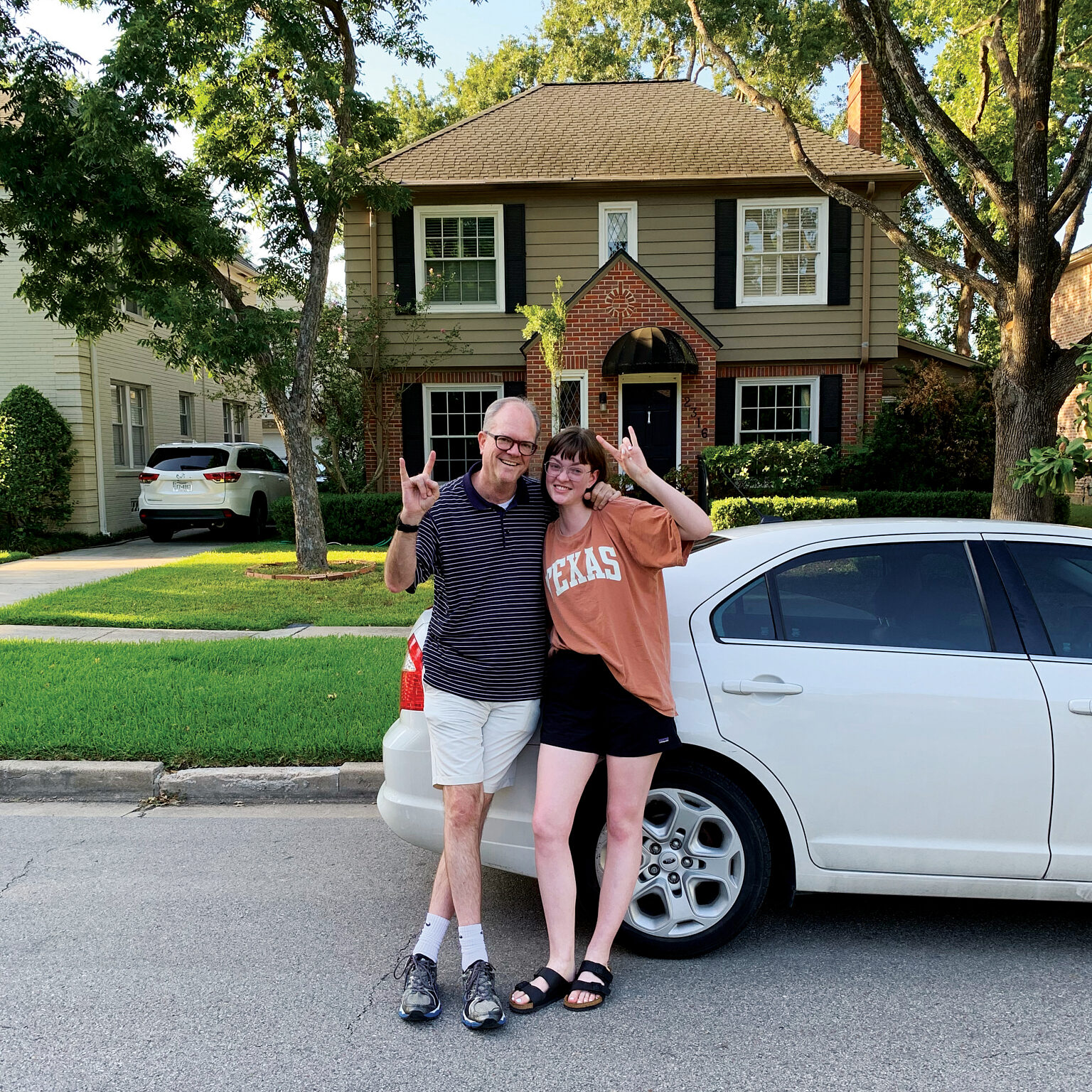
I never expected one weekend could bring about such an extreme reversal. Between my dad’s school pride, Marilyn’s encouragement, and the older Scholars’ insight, I had discovered for myself a fuller image of what college could be. I could have the rigorous liberal arts classes through Plan II and the Thomas Jefferson Center for the Study of Core Texts & Ideas, with the resources of a world-renowned research institution.
When the Longhorn Band marched into the Alumni Center playing “Texas Fight” just for us at the end of the first night’s finalist weekend programming, I felt tears welling in my eyes. I grew up bleeding burnt orange for a reason: There was something incomparable about this place, and I recognized then for the first time that I could find a home here.
I yearned to remain friends with Emma, Jill, Yessmeen, and many of my fellow finalists. I could envision myself welcoming the next cohort of finalists as a Scholar in my own right, and I brimmed with desire for a community in which I could be seen for who I was—ambitious, sometimes awkward, passionate, curious, outspoken—and celebrated for it.
When I got the call confirming that I had earned a scholarship, I immediately withdrew my applications from every other school. I didn’t feel the need to know those results when I had achieved what I had begun to let myself imagine only in my wildest dreams; I didn’t think twice about accepting.
Early into the first semester, I got to meet my donor Will O’Hara, BBA ’68, Life Member, Distinguished Alumnus, at a dinner with the rest of his “scholar family”: Ricky Cooks, BA ’21, Life Member, and Brian Chavez, BSA ’22, Life Member, were also sponsored by Will, whose generosity is only matched by his love for the university. He regaled us with his story of sneaking his way into the press room at Parkland Hospital in November 1963 to be among the first dozen people who heard it confirmed that President John F. Kennedy had been assassinated. Though Will was a business major, he covered sports for The Daily Texan and was inducted into the national journalism honor society Kappa Tau Alpha, which I would later join.

Will prioritizes a close relationship with his Scholars. Now, I’m the senior who is responsible for organizing these “family dinners,” and I get to introduce Amanda Mackenzie, Jerri Do, and Bradley Klinck to Will and his lovely wife Lana. I remember how intimidated I was by Ricky for how confident and accomplished he seemed to my freshman self, and though so much has changed since then, Will’s encouragement and support has never waned.
I had no way of knowing that a global pandemic would mar any semblance of a “normal” college experience, whatever that might have meant for me. On March 13, 2020, my sorority big sister drove me home to Houston with her betta fish buckled into the back seat, still hopeful things would continue as normal after an extended spring break. Fifty days later, my mom and I would make the drive back to Austin to clean out my freshman dorm room, coated in dust but otherwise exactly how I left it the day that classes were canceled.
I tried returning to campus in the fall but living in the sorority house my sophomore year proved untenable for me. Girls were still going out to bars and parties, so I was wearing a mask even in our communal shower and eating every meal alone in my room. I moved back to Houston for the spring semester, where I took classes remotely and received my first Pfizer dose.
Though I knew things inevitably changed while I was away from campus, I knew I would return to a solid community in the Forty Acres Scholars Program. Whitney Carter and Ashley Rasmussen, our scholarship program coordinators, mailed me supplies so I could participate in the Zoom painting class that stood in for our All-Scholar meeting that spring. After my second vaccine, I returned to Austin for the end-of-year barge party, and it was like my friends and I were able to pick up right where we left off. My cohort has been a constant in my life when very little else was, even the things I might have taken the most for granted—my freshman dormitory, bodily autonomy, freedom of movement.
The next spring, I left the cohort behind in Austin once again to study abroad in Paris, France. I was using my Forty Acres enrichment stipend to fulfill my childhood dreams of living in Paris, and I would be taking classes at the internationally renowned Institut d’études politiques, also known as Sciences Po, to earn credit towards my degree requirements in journalism, classics, and history.
I intentionally purchased my class ring the fall before my departure, so I could take something of UT with me. After I managed to get my luggage up seven flights of stairs to my studio apartment overlooking Notre-Dame and the Sainte-Chapelle, I ordered Chipotle on DoorDash. I cried over my burrito bowl; it didn’t taste like home.
But soon I fell in with a group of fellow international students at Sciences Po. I became so enamored of the city that I extended my stay in Paris through the summer. Thanks to my enrichment stipend, I could afford to accept an unpaid apprenticeship at an anglophone bookstore in the Latin Quarter. I felt like I found myself between those shelves—like they had been there all along, waiting for me.
I’d never been happier in my life. I didn’t even know I was a person capable of such happiness. I was more resilient, more daring, and capable of richer friendships in France than I’d been in college so far, it seemed to me. I ended up staying for almost eight months—also the longest consecutive amount of time I’d ever lived in Austin at that point.
After work that summer, I would grab a crêpe or a kebab from a street vendor and borrow a book from the store to read by the Seine until the sun set. A college friend came to visit me, and we watched fireworks explode over the Eiffel Tower together on Bastille Day during a record-breaking heat wave. She finally forced me to buy my plane ticket home, which I had put off until weeks before the fall semester was supposed to start back in Austin.
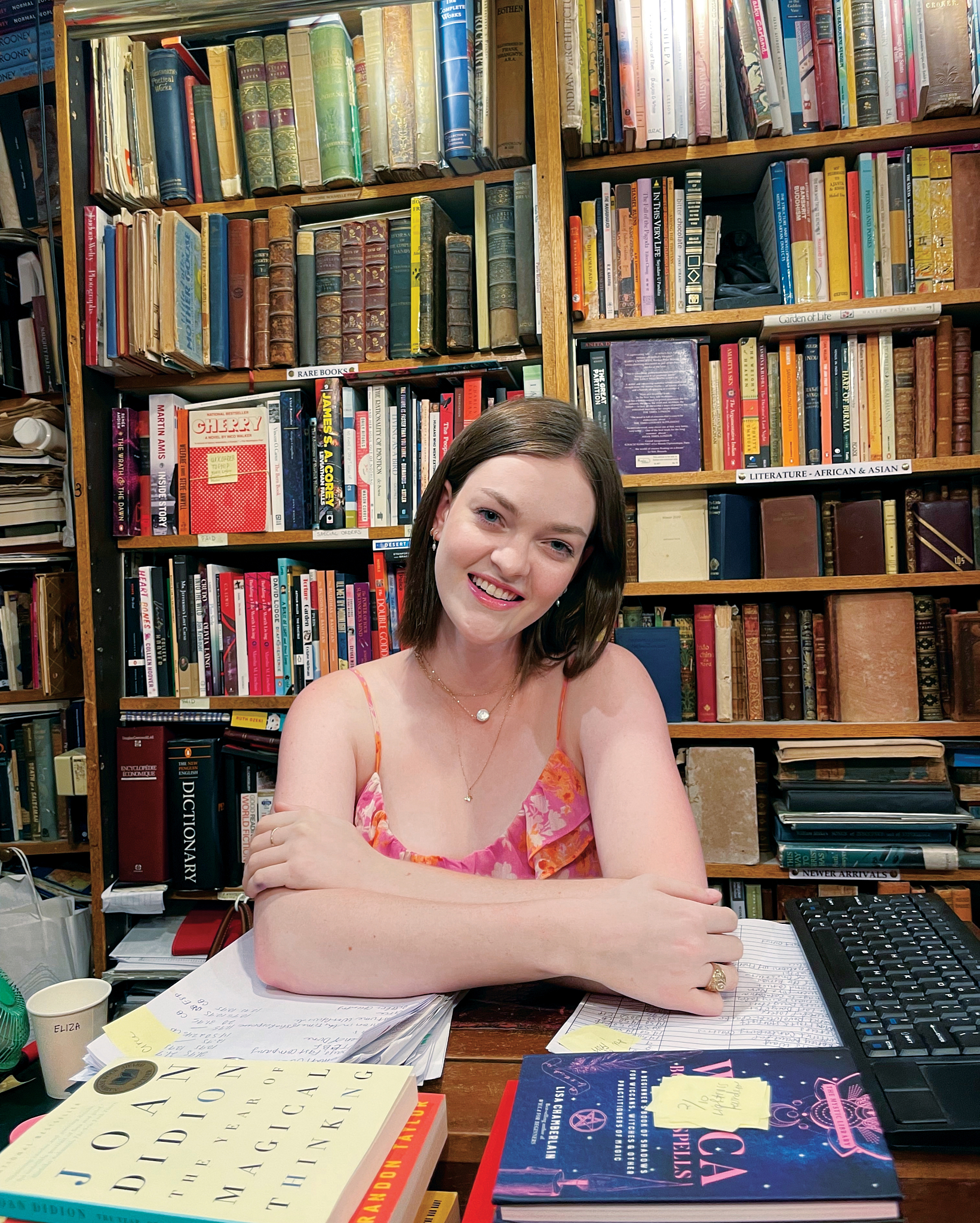
in Paris.
My mom picked me up from the airport with a top-shelf margarita for later. Tex-Mex aside, I can’t say I was thrilled to start classes again. But there were landmarks and people alike whom I had missed dearly while I was away, and I slowly reacclimated myself through them. Homework was made easier by meeting up with junior Scholar Nikita Kakkad at Genuine Joe’s to study on Sunday afternoons or catching up with my fellow senior Scholar and good friend Joseph Dowdall at Cain & Abel’s on a Thursday night.
In the fall of my senior year, I took the final credit I needed for my English minor. Professor Brian Gingrich was taking us through the canon of the European novel, and I welcomed the challenge of Russian literature and the 700 some-odd pages of Thomas Mann’s magnum opus. As we worked through the syllabus, I thought back to my Parisian excursions to pay homage to the desk where Balzac wrote Père Goriot and the bed where Proust wrote In Search of Lost Time.
One afternoon, the weather was perfect enough that we chanced class outside in a courtyard off the Six Pack. Professor Gingrich was wearing a wool-looking jacket complete with quintessential, professorial elbow patches, crouching in front of a white board to explain the metaphor Proust creates of Swann’s way versus the Guermantes way. I sat with my legs stretched in front of me, leaning back on my arms, with my book face down in my lap and my notebook at my left hand. The breeze blew leaves down around us where the class was seated in a circle.
I grinned to myself. So much had changed since I was fantasizing about an idealized version of a college experience that would never really materialize, yet here I was, sitting in a scene out of a daydream. I’d accepted the scholarship without anticipation of a pandemic, without fully comprehending how much my time in Paris would change me, without the relationships with fellow Scholars that would come to define my time at UT. I made the decision based on the information I had at the time, but how much grander had it all become since then, despite untold difficulties.
Amid the stress of writing senior theses and figuring out post-grad plans, our cohort got to travel to Mexico City for our final Scholar retreat. I had never been to Mexico before, and I got to cross so many things off of my bucket list. It was such a full-circle moment to reflect back upon our freshman retreat, when none of us had any idea how much we would learn and grow together. Together, we ate crickets and drank mezcal during a food tour of the famous San Juan Market. During our free time, I made a pilgrimage to see some of Frida Kahlo’s masterpieces at two different museums. We survived—with friendships and dignity both mostly intact—an unexpectedly difficult hike on a dormant volcano, the fourth-highest peak in the country.
Even as I was stumbling (and I’m being painfully literal here) down a particularly steep descent of the volcano, we were in it together, and I felt better knowing that at least we had Tobi Phillips and Marrissa Rawls as trained nurses in the group. And when we marched past the point of no return, Haley Justiz led the way with her characteristic optimism. Call it trauma-bonding, but that trip affirmed the best of what I knew to be true about these people.
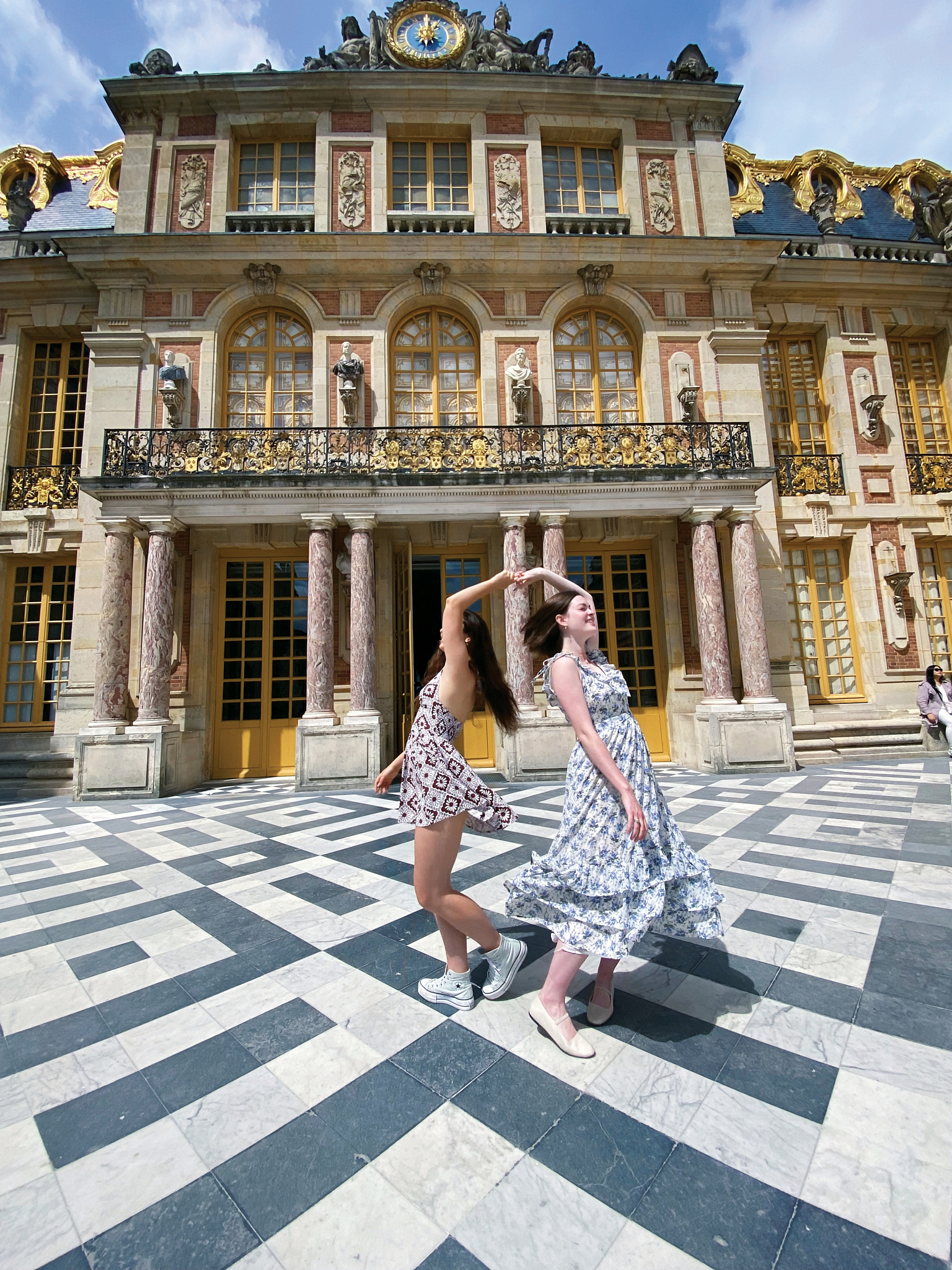
For my final finalist weekend, I was honored to be asked to help conduct the interviews on the last day. I viscerally remember how scared I was during my own interview, some four years prior. The questions were much harder than I’d anticipated, though some small part of me found it exhilarating to be challenged.
I had called my mom crying the moment I left the room, convinced I had bombed it and ruined my future. A week or so later, I was obviously proved wrong, but in the years since, I’ve volunteered to escort finalists to their interview, if only to assuage any anxiety by sharing my own, and how my story ended up. I sat with Nikita outside her interview room, and now she’s my best friend.
I tell these future Scholars to close their eyes, and picture themselves at home. Now, open them.
They’re already there.
Illustration by Christopher Silas Neal, photos courtesy of Eliza Pillsbury
